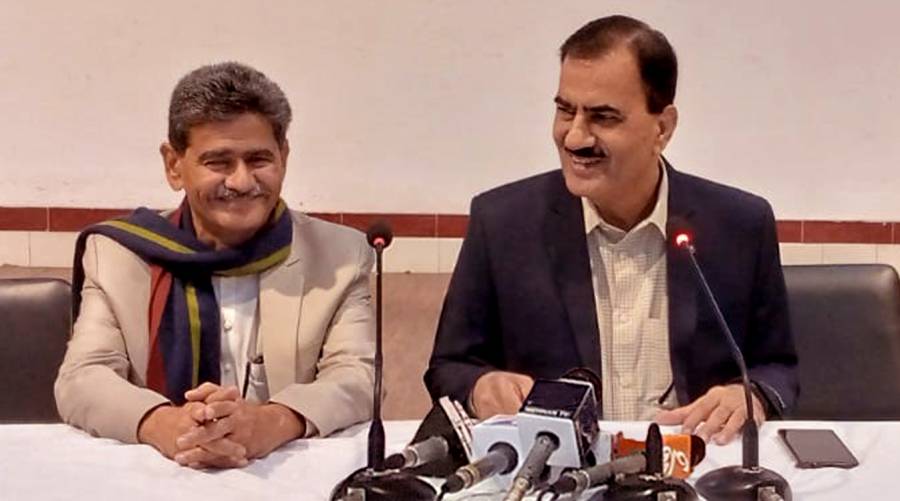PMA report paints bleak healthcare scenario, calls for urgent reforms

KARACHI: In its "Health of the Nation" report for 2024, the Pakistan Medical Association (PMA) painted a bleak picture of the healthcare scenario in the country, being the world's fifth most populous, and recently ranked 124th out of 169 countries by the World Health Organization, calling for urgent and comprehensive reforms in the healthcare system.
The report sheds light on the grim reality of healthcare in Pakistan, citing government-approved drug price hikes that have burdened the population, affecting over 80,000 medications. It points out that inflation and currency devaluation have made essential medicines unaffordable, particularly for the impoverished segments of society.
Key figures, including PMA Secretary General Dr Abdul Ghafoor Shoro, Treasurer Dr Muhammad Shahid Shamim, Joint Secretary Dr. Vasdev, and Chairman Editorial Board-JPMA Dr. Shahid Sami, stressed the urgent need for reforms during a joint press conference at PMA House.
The report underscores the severe impact of the healthcare crisis on public health, saying hepatitis B and C were affecting 15 million individuals due to a lack of prevention, testing, and treatment resources. It calls for government interventions, including implementation of better control measures, such as vaccinations, to curb the spread of these deadly viral diseases.
It warns that unsafe drinking water remains a major concern, contributing to 40pc of nationwide deaths due to waterborne diseases, with diarrhea as a leading cause of infant mortality. The report stresses the urgent need to improve water quality for the enhancement of public health.
Alarming statistics related to HIV infections are also highlighted in the PMA report, with 63,202 registered cases. Limited testing capacity, unsafe practices like syringe reuse, and poor awareness contribute to the spread of HIV, it adds. The report calls for increased testing, awareness, and access to lifesaving treatment to combat the HIV/AIDS crisis.
It says cancer rates, particularly among women, are on the rise, with breast cancer being the most common. Environmental factors and poor dietary habits contribute to the increasing incidence of cancer, making it the second leading cause of death. The report emphasizes the need for awareness and preventive measures.
The association also points out that coronary heart diseases pose a significant challenge, with high mortality rates and highlights the urgent need for comprehensive strategies to address cardiovascular diseases, focusing on risk factor control, public education, and lifestyle changes.
The report says Pakistan ranks third globally in the prevalence of diabetes, with a staggering 30.8pc, stressing the severity of the diabetes situation, calling for concerted efforts through early detection, intervention, and preventive measures.
The report also raises concerns about road traffic accidents, where Pakistan ranks first in Asia for deaths caused by such incidents, besides air pollution, contributing to premature deaths and respiratory infections. Urgent action is needed to protect healthcare workers, particularly during polio vaccination drives, it says.
Furthermore, the report highlights the consequences of climate change on healthcare, emphasizing the need for adaptive strategies and international assistance. Pakistan faces a double burden of disease, with high rates of various illnesses, including high maternal mortality, infectious diseases, lifestyle-related health issues, inadequate access to clean water, and environmental pollution.
The "Health of the Nation" report for 2024 serves as a clarion call for immediate and comprehensive reforms in Pakistan's healthcare system. The PMA urges policymakers to prioritize health and implement meaningful changes to ensure a healthier, more resilient nation.
To address these challenges, the PMA proposes a set of recommendations for healthcare reform in Pakistan. These include increasing healthcare spending, strengthening primary healthcare services, improving accessibility and affordability, enhancing the healthcare workforce, strengthening disease prevention and control measures, improving healthcare infrastructure, implementing effective health information systems, promoting public-private collaboration, increasing community engagement, and continuously evaluating and monitoring healthcare indicators.
Achieving significant improvements in healthcare indicators in Pakistan will require sustained commitment, collaboration, and investment from the government, stakeholders, and the international community, the report suggests.
Trending
Popular
Sindh pledges vigorous action to prevent poliovirus transmission
-
PMA stresses health equity on World ...
04:08 PM, 9 Apr, 2024 -
Dow University’s new rabies vaccine ...
12:18 PM, 28 Mar, 2024 -
IRD role lauded in advancing ...
02:53 PM, 12 Mar, 2024 -
Over one billion people worldwide ...
09:48 AM, 5 Mar, 2024




